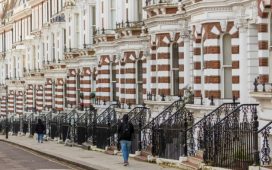Unlock the Editor’s Digest for free
Roula Khalaf, Editor of the FT, selects her favourite stories in this weekly newsletter.
Landlords have warned that changes to stamp duty on second homes, including buy-to-let properties, will hurt the supply of homes in the rental market.
Ben Beadle, chief executive of the National Residential Landlords Association, said that raising stamp duty on homes to rent “makes no sense” and warned the tax increase would contribute to a “net loss” of rental homes as fewer landlords bought into the sector.
Chancellor Rachel Reeves announced the increase in the surcharge on stamp duty levied on purchases of second homes from the current 3 per cent level to 5 per cent as part of a £40bn package of tax increases that she said are needed to fix Britain’s public finances.
A landlord buying an average home would pay an additional £7,000 in stamp duty, property website Rightmove calculated.

The changes will take effect for anyone who exchanges contracts after Thursday, preventing buyers from rushing through transactions in order to avoid paying more.
The Treasury said the measure would favour first-time buyers, giving them a “comparative advantage” over those buying a second home or investment property.
The changes are expected to result in “130,000 additional transactions over the next five years by first-time buyers and other people buying a primary residence,” according to Treasury documents.
Campaign group Generation Rent said the Budget favoured more affluent renters who were close to being able to buy, but did little for others.
“Renters who have been able to save a deposit to buy a home will get a boost from the increased stamp duty surcharge,” said Ben Twomey, chief executive of Generation Rent. “The higher costs for investors will make it easier for first-time buyers to compete in the house sales market.”
However, first-time buyers will themselves face larger stamp duty bills once temporary increases to the thresholds from which the transfer tax applies expire in April. The level at which stamp duty becomes payable are set to revert to £300,000 from £425,000 for first-time buyers and to £125,000 from £250,000 for others. The higher levels were introduced in 2022.
The changes mean that about nine in 10 movers will face a stamp duty bill, up from half today, according to estate agent Hamptons. The agency said that first-time buyers, who could face an increase of more than £11,000, would be “hit hard”.
Tenants have faced record rent increases in recent years, which have been partly blamed on higher mortgage rates and previous tax changes that are making buy-to-let properties a less attractive investment.
Roarie Scarisbrick, partner at buying agency Property Vision, said the stamp duty increase gave “another bloody nose” to investors and developers who he said were already “on the ropes with skinny yields and increased costs and regulation”.
Richard Donnell, head of research at property website Zoopla, said he was already seeing an elevated level of selling by second homeowners due to higher council tax charges. The stamp duty changes would further “reduce demand from second home buyers and investors”, he said.
But there was some relief for property investors in that the capital gains tax rate levied on profits from disposals was held at 24 per cent, having been cut from 28 per cent in the spring.











